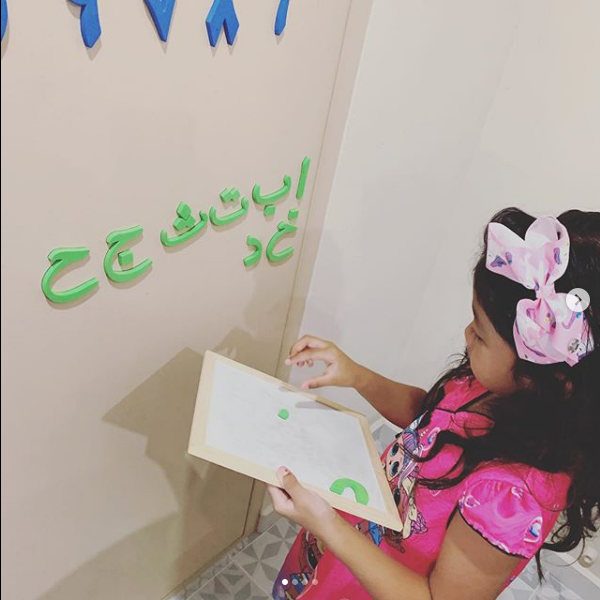
The Importance of Delayed Gratification
Today, access to media is ubiquitous; children, infants and toddlers are digital natives who grow up surrounded by all sorts of digital devices from the omnipresent mobile phones to the slim tablets that somehow finds itself perched precariously on babies’ strollers! Our lives are made more convenient with online shopping and cashless payment. The world runs on trends – the motto YOLO is highly preached, self-love comes first and everyone feels entitled to a little bit of something. When our children and youths can easily make friends through social network and MMORPGs (Massively Multiplayer Online Role-Playing Game), is there any room to exercise self-control and delay gratification?
After giving birth recently, I began to seriously ponder on parenting and how we can raise God-conscious children in this digital era. Now, I have nothing against technology; I love technology although I don’t think I’m clever enough to join Ethan Hunt and the Impossible Mission Force’s team. What worries me is how exposure to gadgetry at such a young age expels the need to delay gratification. To be able to delay gratification, one needs to exercise self-control and according to Prof. Roy Baumeister, the author of ‘Willpower: Rediscovering the Greatest Human Strength’, “self-regulation failure is the major social pathology of our time,” and that “self-control is much more powerful and well-supported as a cause of personal success.” Which parents do not want their children to be successful?
Islam, Self-Control & Delaying Gratification
Self-control has a huge role in Islam. As Muslims, we are asked to exercise self-restraint in many aspects of our lives. We leave behind our worldly affairs for a moment while focusing in our solah. We abstain from food, drinks and marital intimacy when we are fasting. Hajj and Umrah require us to perform the rites with fortitude. We are asked to ‘lower our gaze’ as one of the means of distancing ourselves from adultery and fornication. Allah s.w.t. said in the Quran:
But as for him who feared standing before his Lord, and restrained himself from impure evil desires and lusts. Verily, Paradise will be his abode." (79:40-41)
In a hadith narrated by Bukhari and Muslim that is reported by Abu Hurairah r.a. (may Allah be pleased with him), the Messenger of Allah (ﷺ) said, “The strong man is not one who is good at wrestling, but the strong man is one who controls himself while in a fit of rage.”
Even the Prophet emphasised that self-restraint is a desirable trait in a believer.
In summary, suffice to say that practising Islam in its entirety helps to instill discipline in the individual, gain Allah’s love and mercy and be rewarded with Jannah. However, the promise of Paradise is not immediately rewarded now on earth thus gratification is delayed. To put it in laymen term, Muslims are reminded to be constantly patient (self-control) while striving to perform their obligations and duties as a Muslim (exercise willpower) to enter Paradise (delay gratification).
This whole concept of self-control and delaying gratification is hard to grasp and practise for an adult, what more of a child. (Remember how difficult it is to focus at work at 4.30pm when you were depleted of energy and all you could think about was what to have for dinner so you started scrolling FoodPanda because you were too tired to cook?) How then can we parents nurture our children with these “soft skills”?
Children, Self-Control and Delaying Gratification
Soft skills, or academically referred to as executive function skills, are fundamental to a child’s ability to do well in school. It helps a child to pay and manage attention, resist distraction and sustain their learning. Or what remains of it. Self-control helps a child to harness their willpower and engages actively in their learning at school at 8.30am while knowing full well that a well-deserved break is already scheduled at 10.30am without them having to think too much about it.
In a popular experiment conducted at Stanford University Bing Nursery School in the late 1960s by Dr. Mischel and team, hundreds of four-years old were subjected to a little test of willpower involving marshmallows. In this experiment, now more famously known as the ‘Marshmallow Test’, the children were placed in a small room with a single marshmallow for fifteen minutes. They were told that they could eat that single marshmallow right then but if they could wait for fifteen minutes, they could get two. Naturally, some of the children could not resist their temptation while those who waited for the ‘greater reward’ exercised all means to distract themselves.
When these children were tracked in their teenagers and adulthood, the gratification-delayers were reported to have less behavioural problems at schools, obesity or addiction and better SAT scores. They also had better jobs and relationships with others. Don’t you feel that it is indeed necessary for us parents to help our children to develop the ability to delay gratification and exercise self-control?
Islamic Parenting Tips
Islam has non-negotiable principles of faith that strengthens our management of self and willpower. Here are some of the things that parents can do to develop self-control in children:
- Talk about Allah as the All-Seeing (Al-Baseer), All-Hearing (As-Sami’) and All-Knowing (Al-‘Aleem) so they will refrain from doing what is loathed or forbidden by Allah and His Messenger. By learning these attributes of Allah, children will be warier of their actions for they are constantly reminded that Allah is watching them all the time. It helps to nurture what Imam Nawawi termed as ‘Muraqabatillah’ in his famous book Riyadhus Sholiheen.
-
Share with your children about Jannah, its beauty and the rewards that await them there. Read the translation of the Quran that talks about it, buy books that tell stories of good deeds and the bounty of Paradise. Make them long for it and make doá as a family that it may be our final abode.
- Teach them to manage their emotions. Be an ‘emotion coach’.
Allah s.w.t. said in Surah Ar’Ra’d verse 28, “Verily, in the remembrance of Allah do hearts find peace.”
Teach your children to say dhikr when they feel sad, unhappy or anxious. Dhikr helps to dispel heaviness in the hearts and thus control one’s emotions besides bringing a Muslim closer to Allah. When children feel frustrated or angry, share with them how to deal with it the Prophetic way. In a hadith narrated by Ahmad and Abu Dawood, the Prophet advised us to change our positions from standing to sitting or from sitting to lying down when we are angry or to take wudhu’. Never ridicule a child’s feeling. Instead encourage them to share it with you and use it to teach them life skills.
In reality, there are many ways for parents to help develop and nurture these traits in children. The list is not exhaustive and the key to all this is us: parents. Children look up to us as their immediate role models. We need to redefine our purpose in life, our values, principles and belief in Allah for us to be able to unlock the potential in our children. They are our only hope for the future and for that we must persevere.

Comments
Leave a comment